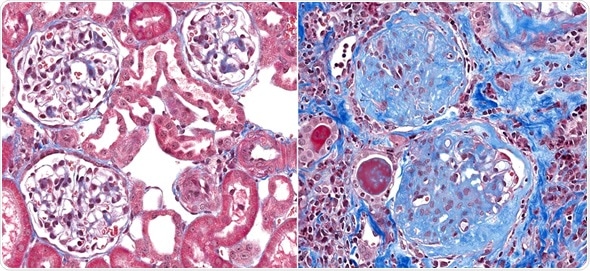Glomerulosclerosis refers to the scarring of the glomeruli in the kidneys following any type of insult.
The glomeruli are the tiny loops of capillaries that rest on the special basement membrane which is found in the glomerular units. They filter out waste from the blood and produce the first fluid that is then processed within the renal tubules to form urine. At the same time they keep blood cells and proteins within the bloodstream passing through the capillaries.
When the glomeruli are damaged, they may heal by scarring. This means they lose their normal function. This appears clinically in the form of proteinuria. At the same time, loss of normal renal filtering capacity leads to the build-up of metabolic wastes such as urea and creatinine in the body, leading to toxic symptoms.

Normal healthy glomeruli (left) with glomerulosclerosis (right) a condition with fibrosis (scar) of the glomeruli (blue stain). The thin loops of blood vessels are replaced by the blue scar tissue. Image Copyright: vetpathologist / Shutterstock
There is no age or gender predilection. When it is due to glomerular injury, the glomerular cells are stimulated to produce fibrous connective tissue by various inflammatory mediators, including growth stimulators. In other conditions, the growth mediators are carried in the blood from other parts of the body.
Symptoms and Signs
Glomerulosclerosis is often asymptomatic in the beginning. Once it is established, the primary sign is loss of protein from the blood in the urine, or proteinuria. This is, in many cases, detected via routine urine testing. However, there are many other causes for proteinuria and only about 7-15% of people with protein in their urine have glomerulosclerosis.
Proteinuria leads to a deficiency in the osmotic pressure of the blood – this means it is less able to retain fluid within the intravascular compartment of the body. This is manifested as pedal edema or swelling over the feet and ankles. Other sites of edema may occur, such as:
- swelling of the abdomen due to the exudation of fluid into the peritoneal cavity
- swelling around the eyes
- generalized edema
The presence of massive proteinuria is often an indicator of the high risk of end-stage renal disease.
Causes of Glomerulosclerosis
The cause of glomerulosclerosis may be any of the following, or idiopathic:
- Diabetes
- Systemic immunologic diseases such as systemic lupus erythematosus
- Glomerulonephritis due to infections, drugs or toxins – this includes post-streptococcal glomerulonephritis,
- Hereditary conditions such as Alport’s syndrome
- Focal segmental glomerulosclerosis – this is an idiopathic condition in which there are scattered foci of sclerotic damage. This makes diagnosis and treatment more difficult.
Diagnosis and Management
Diagnosis of glomerulosclerosis is based upon the demonstration of proteinuria and the characteristic finding of glomerular fibrosis and loss of anatomy upon renal biopsy. An ultrasound is often recommended to detect any changes in renal anatomy.
Treatment varies depending upon:
- Severity of the condition
- Previous health status of the individual
- Age of patient
- Tolerance of various therapeutic modalities
Management is directed at preventing further damage, because already scarred glomeruli cannot be repaired medically or surgically. First, the cause or condition that led to glomerulosclerosis must be identified, if it is not already known.
Treatment
The available options may include:
Immunosuppressants
These will prevent the production of autoimmune antibodies in autoimmune renal conditions
Anti-hypertensive Agents
These are to limit the progression of the renal damage both by the underlying condition and by an elevated blood pressure, especially angiotensinogen-converting enzyme (ACE) inhibitors and angiotensin receptor blockers (ARBs)
Dietary Changes
This includes sodium and protein restriction to reduce the load on the kidneys
Dialysis
This is required to replace renal function in end-stage renal disease
Kidney Transplant
This may be necessary for irreversibly damaged kidneys which fail to maintain minimum levels of renal function.
References
Further Reading
Last Updated: May 18, 2023